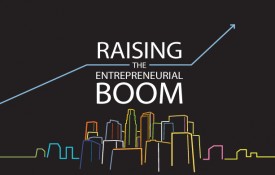“Money is the seed of money, and the first guinea is sometimes more difficult to acquire than the second million.” – Rousseau
Small business growth in America has dropped significantly. Although small businesses account for 48.5 percent of all employment and more than 60 percent of all new jobs in this country, the Great Recession crippled entrepreneurs for five straight years and our economy is only just beginning to come back. The most recent data signals that our economy might have turned a corner in employer firm births, but the gains so far are negligible. The fact remains that our economy is giving rise to about 75,000 fewer businesses a year than before 2007.
In 2012, President Obama signed the JOBS Act to stimulate growth for American small businesses. His signature immediately put Titles I, V, and VI of the act into effect, laying the groundwork for the modern crowdfunding industries. Since then, Titles II, III, and IV have also been approved. Title II, in effect since 2013, allows companies to generally solicit investment interest from accredited investors. Title III, only recently approved, expands general solicitation and investment to unaccredited investors, and greatly expands the equity options for startups and entrepreneurs. Perhaps the most far-reaching of the titles, Title IV, also known as Regulation A+, was approved in June 2015; it does away with state-by-state securities laws and registrations (better known as blue-sky laws) and instead funnels offerings through the SEC. Additionally, it lets entrepreneurs and startups raise up to $50M through the sale of securities to both accredited and unaccredited investors, and gives investors access to exciting new opportunities.
These regulations regarding crowdfunding in its various forms give entrepreneurs a powerful alternate pathway to the capital they need to grow, and offer major economic reforms for investors seeking to invest in small business equity. For almost a hundred years, these kinds of investments were limited to an elite few, and now it’s finally set to benefit the people who need it most. This historic economic policy should send a clear message to all Americans: this country and all of its benefits are for everyone, regardless of race, gender, or geographic location.
As we anticipate Title III, set to begin May 2016, and we enter Title IV’s sixth month, we are only just beginning to see the effects of the JOBS Act. Doing away with the investing privileges associated with being accredited, and extending one of the most important investment opportunities — private small-business equity — to everyone who meets the new requirements, is a titanic upheaval, but it was necessary to protect our economy and personal freedoms.
The JOBS ACT is not just massive economic upheaval a long time coming, it’s also powerful social legislation that will save our democracy.

The Old Model: A large sum of money from one source (Illustration by Jamie Ludovise)
An Economic Revolution 222 Years in the Making
The Declaration of the Rights of Man and of The Citizen was written by the National Constituent Assembly in the month following the storming of the Bastille. While the French Revolution was not without its problems, it nevertheless produced a foundational work in the defense of inalienable human rights. At the time, The Declaration was an affront to the Ancien Régime and the French Monarchy. It called for rights that had been denied to the lower classes for thousands of years: the immediate end to aristocratic privileges, the equality of all men, the right to political involvement, and the right to freedom of speech. In many ways, The Declaration of the Rights of Man is the philosophical culmination of France’s marginalized lower and middle classes physically shrugging off the yoke of their oppressors.
The monarchy and church of France’s Ancien Régime claimed a divine right for the rigidity and oppression of the 3 estates system. Under these conditions, wealth distribution was wildly unequal and the French lower and middle classes bore the majority of the burden despite owning less than 15 percent of the country’s wealth. While the United States has remained free from the tyranny of monarchy, and mostly free of church interference, we could not escape the development of a wealthy nobility. A powerful economic elite holds the reins of this country, and their grip can be plainly seen in the policy enacted by our government over time. These wealthy select can be found in a few dozen ZIP codes, each on the edge of a major financial center. Where capital clusters in America, business, prosperity, and growth come to huddle as well. Nowhere is this more evident than in our thriving tech industry – in the startups that have found life in the stables of Manhattan and Palo Alto, and the empty cities in the wake of this generation’s migration toward employment.
Even though there is no divine right within the United States, we have somehow ended up with a similar striation to pre-revolution France. More and more, it has become clear that the lower and middle classes of this country bear the burden of supporting the economic elite and corporate America. The conditions are frighteningly similar, and the Occupy movement is confirmation. When the middle class keeps growing poorer and solutions seem distant, it is the revolutionaries who come in and change things. To recharge our economy, and protect our democracy from falling into the hands of a select few, change needs to happen.
A Brief Summary of Current American Economic Inequity
If the government listens to businesses more than it listens to its people, then there is no doubt that economic policy affects social policy. But consider who makes up the majority of those entrepreneurs and business owners, the ones who end up with the most say.
Despite our advances in communication, major business deals are more likely to take place face to face. Even today, the biggest limiting factor for entrepreneurs is how close they are to traditional sources of growth capital — financial centers. In 2014, almost 75 percent of all VC investments went to businesses in California, Massachusetts, and New York. Furthermore, 46 percent of total dollars invested nationwide and 30 percent of all VC deals in the country took place in Silicon Valley alone. Unsurprisingly, living closer to a financial center increases an entrepreneur’s chances of receiving the necessary funding.
If, in America, economic policy speaks louder than social policy, then equity crowdfunding and the new regulations provide a definite route toward a radically different economic landscape than the one we have today.
But even more troublesome than the limited geographic scope of VC investment is the wide racial and gender divide that exists between straight white men and literally everyone else. Women make up only 18 percent of angel investors and 11 percent of VCs, while non-whites comprise only 4.5 percent of angel investors and less than 13 percent of all VCs. In 2010, less than 1 percent of VC-backed companies were African American; from 2011-13, only 3 percent of total VC capital went to companies helmed by a woman.
By opening the opportunity to invest in private company equity to everyone, and broadening access to capital typically denied to companies outside traditional financial sectors, we should expect an influx of female and minority entrepreneurs, investors, and executives. If, in America, economic policy speaks louder than social policy, then equity crowdfunding and the new regulations provide a definite route toward a radically different economic landscape than the one we have today.
The JOBS Act is not just for entrepreneurs to gain access to capital through alternate means, it’s also for the middle-class investor who can now invest in the next Uber or Oculus and make hundreds or thousands of times their investment. It is investing like any other; the opportunities for success can scale based on the sophistication of the investor. But equity crowdfunding evens the odds by offering a more favorable path to capital for entrepreneurs from marginalized groups, or lets other groups invest in companies helmed by members of their community. Nothing will stop people leveraging their connections, but the new equity crowdfunding rules will give people without wealthy networks a better chance of achieving success by allowing them to draw from a larger pool of investors and capital. Rewards-based crowdfunding has already proven capable of raising funds in high enough amounts to start businesses, like Oculus and Pebble. Equity crowdfunding will most likely incorporate some rewards elements and reach similar heights for Title III, and even greater sums for Title IV once investors understand there’s a far greater return possible.
While it is still too early to quantify the effects of Title IV, crowdfunding data exists for Title II, and from the equity crowdfunding markets in England and abroad. By the time Title III comes into effect in May 2016, America will have had ten months of Title IV equity crowdfunding under its belt, and will be able to begin to see the positive effects of this socially conscious economic policy.
If equity crowdfunding can succeed, it could counter-balance the economic elite and bring an end to the exclusive policies that previous presidents have passed into law. Make no mistake. The JOBS Act is the start of our quietest revolution and its regulations will stand as the first draft of The Declaration of the Economic Rights of All.
Equity Crowdfunding: The New Financial Diaspora
A city like Los Angeles, second behind San Francisco in terms of technology, second to New York for access to capital, was cut out of the Venture Capital equation before the JOBS Act. I find it amazing that the media center of the country could go largely ignored in terms of VC investment, but before these investments were democratized, it was still largely limited by geography. But, once the JOBS Act regulations go into full effect, equity crowdfunding will be great to LA. The city contains the perfect combination of factors — the right people, with the right ideas, with access to liquid capital ready for investing.
[O]nce the JOBS Act regulations go into full effect, equity crowdfunding will be great to LA. The city contains the perfect combination of factors — the right people, with the right ideas, with access to liquid capital ready for investing.
Already, the equity crowdfunding industry has begun to take off in LA. Because of our large, diverse population and well-developed industries besides finance, LA contains the capital necessary to fund projects and raise awareness. Snapchat resides here, feeding off the city’s energy and nightlife, translating experience to income. But Los Angeles also has a vibrant media industry that excels at storytelling and creative expression. Equity crowdfunding provides new marketing and advertising opportunities, as well as new infrastructure and institutions dedicated to disseminating the message of prosperity that the JOBS act represents.

The Equity Crowdfunding Model:
Smaller sums of money originating from multiple sources, prospectively around the globe
(Illustration by Jamie Ludovise)
There is a reason why I settled here, opened StartEngine as an accelerator, and then shifted to an equity crowdfunding platform: the confluence of talent in this city is impossible to ignore. LA might be the second largest technology center in California, and the third in the United States, but the presence of the media, music, entertainment, and arts industries has made Los Angeles a hotbed for creatives. The video game industry has made LA its home because of this, and other crowdfunding and crowdfunding-related companies are beginning to take notice. After all, StartEngine is no longer alone in LA. We have been joined by other companies like equity crowdfunding platform Crowdfunder, real-estate equity crowdfunding platform Realty Mogul, and crowdfunding campaign producers CrowdfundX, all of whom fill other vital equity crowdfunding niches.
The Moral Responsibility of Equity Crowdfunding
Whether or not we wanted it or choose to wield its power, we have to face the fact that we are the economic elite, the American nobility. If there is no boogeyman social class above, then we must also accept our current economic environment as the inevitable product of our own desires — to perpetuate the oligarchy and remake America in a way that is absolutely anathema to what it means to be an American.
For the moment, at least, the scales lean heavily in favor of business, but we have not yet tipped totally toward plutocracy. We are lucky, in many ways, to have a strong federal government to provide counter-balance and enact such forward thinking policy as the 2012 JOBS Act. If this is indeed a country controlled by its economic interests, then the SEC’s recent decisions to lift outdated investor restrictions and increase access to vital growth capital could signify an important tipping point in our country’s political identity.
If we do turn this corner, it won’t just be LA that gains. Every city and person in America will benefit from these regulations. Anywhere people have a great idea can be where they start their company. Ending the geographic hegemony will do more than just diversify the locations, it will add diversity as new opportunities become available to new regions. It wasn’t taken from the nobility with a sword, but these economic changes are still a massive victory for everyone and a vital step toward protecting our democracy. <












































